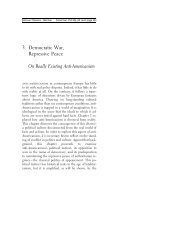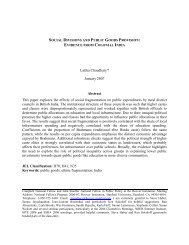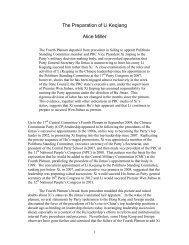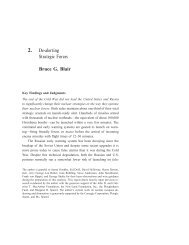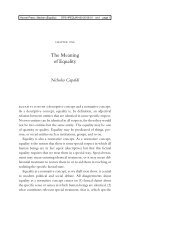A New Clandestine Service: The Case for ... - Hoover Institution
A New Clandestine Service: The Case for ... - Hoover Institution
A New Clandestine Service: The Case for ... - Hoover Institution
Create successful ePaper yourself
Turn your PDF publications into a flip-book with our unique Google optimized e-Paper software.
<strong>Hoover</strong> Press : Berkowitz/Intelligence hberai ch4 Mp_125_rev1_page 125<br />
A <strong>New</strong> <strong>Clandestine</strong> <strong>Service</strong><br />
125<br />
report’s issuance was largely upstaged by the illness and death of<br />
Pope John Paul II: It did not, and is now not likely, to generate the<br />
attention and public pressure that such reports require to galvanize<br />
action against resistant, accomplished bureaucratic power players.<br />
(With the possible exception of the Pentagon, the CIA, which has<br />
always been dominated by the Directorate of Operations, is the<br />
most politically adept bureaucracy in Washington.) <strong>The</strong> publicitydevouring<br />
9/11 Commission also had already sucked up most of the<br />
oxygen in the capital necessary to sustain a serious intelligence<br />
debate.<br />
Congress and the White House are unlikely once more to work<br />
up the self-flagellatory energy to severely question Langley about<br />
its operational prowess unless we get hit again inside the United<br />
orities in response to changing events, and adjust the collection strategy correspondingly.”<br />
Sounds fine in theory. In reality, these new offices are going to be<br />
staffed by CIA case officers—or Pentagon case officers schooled by Langley (and<br />
Robb-Silverman wants to increase Langley’s control of case officer education).<br />
Robb-Silverman somehow envisions these new entities as existing outside of the<br />
Directorate of Operations—the report, without exploring the origins of the DO’s<br />
culture, understands that the culture is toxic—but within the CIA.<br />
This is a meaningless bureaucratic division. Senior and midlevel case officers<br />
raised in the <strong>Clandestine</strong> <strong>Service</strong>’s defective system will immediately take over<br />
Robb-Silberman’s new CIA.<br />
Langley has rarely not known what the truly important targets are supposed<br />
to be. A Target Development Board will just repeat the targets that the CIA knows<br />
it ought to hunt seriously. <strong>The</strong> CIA has always had “mission managers”—chiefs<br />
of station and base have always directed junior officers toward these targets (and<br />
other more reliable ones that guarantee case officer and station head counts). It<br />
would also be a demanding task to count up all the “innovative” operational<br />
cables DO management has sent out encouraging case officers to “think outside<br />
the box.” Point: <strong>The</strong> headquarters, and especially overseas bureaucracy, makes<br />
the culture and the men and women of the Directorate of Operations. Until this<br />
bureaucracy is gutted—which means at first firing, not hiring, large numbers of<br />
case officers and radically rebuilding the way most case officers are deployed<br />
overseas—the many good ideas within the Robb-Silberman report have little<br />
chance of producing a more effective clandestine human intelligence collection<br />
program against America’s hard-target enemies.<br />
Given the influence and bureaucratic agility of the DO within the CIA, the<br />
Robb-Silberman report is much more likely to encourage the directorate’s worst<br />
instincts and habits, not curtail them.



